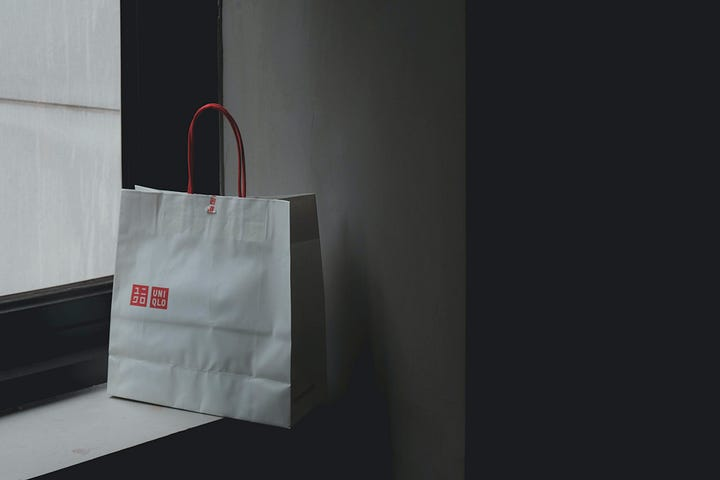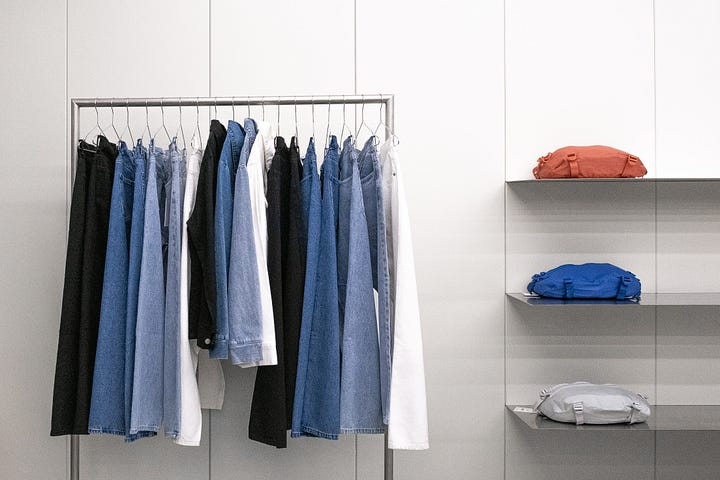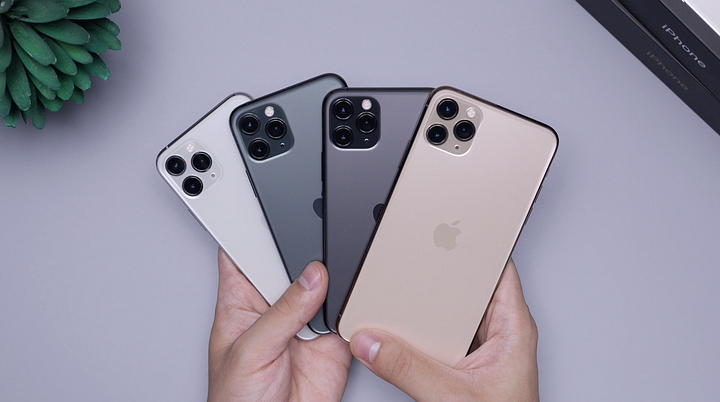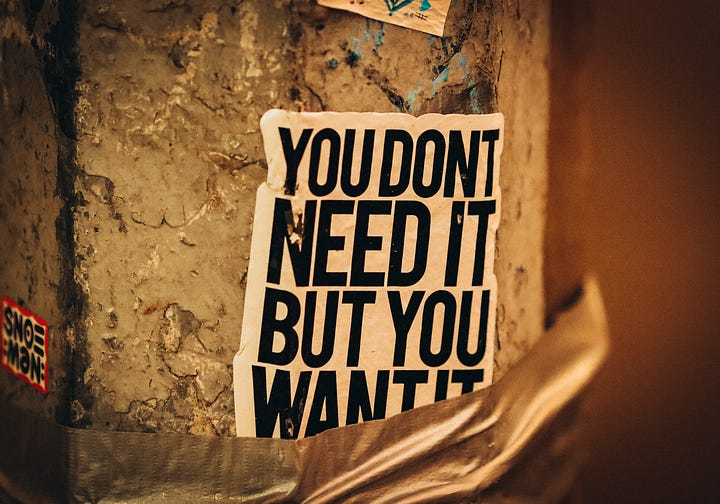Original link: https://shyrz.me/cyberclip-42-the-illusion-of-minimalism/


23 · 09 · Issue 42 of Issue 23
Everyone, the autumn breeze brings coolness, and the letter is like a face. Thanks to the friends who tipped in the last issue!
The selected article in this issue “The Commodification of Minimalism” is a profound reflection on the trend of minimalism that has emerged since 2010. It points out that the irony of this trend is that this kind of minimalism is another form of luxury. , and at the same time its advocates are largely exploiting the general public’s anxiety about missing out (FOMO) about the new lifestyle to reap profits.
Hope it inspires.

Talk to your data and get insights in seconds

 Hal9 →
Hal9 →
Use secure generative AI to chat with your enterprise database and empower business users on your team to perform autonomous data analysis in seconds.
(Clicking on the link above can help me operate better. I will receive a small sponsorship for every valid click you make)

The commoditization of minimalism
and the rise of lifestyle materialism.
→ Original link : The Commodification of Minimalism — Mike Grindle / Medium / 2023-08-11
 Source: Henry & Co. / Unsplash
Source: Henry & Co. / Unsplash
Have you ever noticed that everything nowadays seems to have a “minimalist” feel?
Ironically, the minimalist aesthetic seems to be everywhere, from recently deconstructed corporate logos to Instagram-worthy interior spaces, trendy clothing, Apple tech gadgets, and mobile-friendly blank web pages.
If social media is anything to go by, it seems like every influencer is on board. Every fashionable young person either wears a neutral-colored backpack and becomes a “digital nomad”, or spends a whole day in the forest in a “living in nature” way, or treks through the spacious, empty and beautiful house overlooking the street below.
It’s enough to inspire an urgent desire to clean your home or get rid of your most prized possessions.
This is enough to make you jealous.
As someone who identifies as a minimalist in some quarters, I think most minimalist uptake is positive.
As someone who identifies as a minimalist, I see this minimalist trend as mostly positive. Perhaps this is a necessary antidote to the havoc consumer culture is wreaking on our lives and our climate.
But is today’s minimalism really the abandonment of all the “stuff” that makes us miserable and the planet sick? Or is this just another form of consumerism? A new product for the privileged to play with and for the masses to crave?
The rise of new minimalism
 Source: Bench Accounting / Unsplash
Source: Bench Accounting / Unsplash
What are we talking about when we talk about minimalism? Another irony about minimalism is that it can refer to many things, from different philosophies and practices to architectural and artistic styles to various forms of asceticism.
Minimalism is sometimes considered a reaction to consumerism. Other times, it’s more about objects – where we put them, how they affect our mood, and whether they “spark joy.” On other occasions, minimalism is portrayed as a means to increase efficiency, as if it were a secret barrier between billionaires and disorderly beings.
Regardless, it’s important to note that these ideas are not new. In fact, minimalism as a philosophy can be traced back 2,500 years ago .
But what about minimalism as we know it today? The kind that gets discussed in Medium articles and appears on Instagram under the #minimalism tag? It all started after 2010.
The current movement, which some people call “new minimalism,” has many pioneers. But few are as influential as the so-called minimalists Joshua Fields Millburn and Ryan Nicodemus.
Since launching their website in 2010, Joshua and Ryan have seemingly taken the world by storm with their ideas about living a more meaningful life by cutting back on material possessions. They have given TED talks, continue to host a wildly popular podcast, released two documentaries on Netflix, taught courses, and published several books, including the New York Times bestseller Love, Use Love People, Use Things (2021).
“Professional organizer” Marie Kondo has built a career that almost parallels that of minimalists, and her “KonMari” organizing technique has graced homes around the world in the form of books and a Netflix reality TV show. In 2019, after successfully telling people to throw things away, she also opened an online store selling a variety of “meaningful items.”
Both minimalists and Marie Kondo have their share of criticism. Some have noted the fortunes minimalists have made criticizing profit-seeking corporations. Others pointed out the irony (there’s that word again) of Marie Kondo’s online store . It’s hard for anyone not to question whether there’s anything minimalist about flooding the world with endless content, including books you can now buy on Amazon for $14.
Minimalists, for their part, are unwavering in their mission, noting in their book Love People, Use Things that it’s not about having less but “making room for more—time, peace, Creativity, experience, satisfaction, freedom ”.
But no matter what you think of them or the movement they champion, it’s hard not to dispute the underlying principles behind their message. Even now, minimalism seems to be the answer to a lot of problems, from the popularity of fast fashion to disposable tech gadgets to our constant state of distraction in an online world .
However, it is undeniable that people like minimalists and Marie Kondo do much more than teach people how to “organize.” Whether intentional or not, they are telling people that being a minimalist can be a lucrative career.
Provocative Content and Minimalist Anxiety of Missing Out
 Source: Nadin Mario / Unsplash
Source: Nadin Mario / Unsplash
For today’s minimalist content creators, it’s not enough to just give away the ugly sweater their grandma knitted or buy a supercar without taking out a loan. Oh no. Now, the average creator needs a podcast, an online course, an Instagram account, a downloadable PDF, a YouTube channel, a Medium account, a documentary series, and of course a book to tell the story of their simplified life.
If you don’t believe me, go search the word “minimalism” on Amazon and have a good browse in everyone’s favorite dystopian bookstore. I guarantee you, you won’t even believe how many things are telling you to stop buying stuff through this site because it makes buying stuff so fun and easy.
This begs the question: Are these minimalists happy just because they are minimalists? Or are they more excited about telling us about incredible new lifestyles (for a fee)?
Putting that aside, the problem that thousands of minimalist creators now face is that no matter how vivid and life-changing you promote it, across a variety of different media, “decluttering” “Your room” has only so many ways to express it, and no matter how engaging you make it, it will only attract so many people to listen.
In fact, in the online world, no matter what “niche” you are in (or ecological niche , a focused and targetable part of the field), what attracts people’s attention is sensationalism, not substantive content. In the minimalist community, you don’t have to look hard to discover this.
Since the mid-2010s, there has been a steady wave of minimalist content. From blogs about the 100-item challenge to videos of white men traveling around the world with only 10 items (one of which must be a brand new Macbook) to all those photos of large high-end interior spaces filled only with plants and capsule clothing cupboard .
Whether the topic is RV living or an extreme form of frugality, the underlying point of this content is always the same: “This is how you should live—this is how you wish you could live. This is how you can live if you listen to me.” “
The rise of this “seductive” content hasn’t escaped the attention of the minimalist community either. In fact, some of minimalism’s harshest critics were or are minimalists themselves. One of them, Messy Minimalist, pointed out that the message behind minimalism has definitely changed.
Minimalism is no longer just about simplifying your life, it’s increasingly being known as aesthetic minimalism – how stylish, uncluttered, light and airy your home is.
In the wake of the 2008 financial crisis and subsequent years of austerity, people are eager to escape busy and debt-ridden lives. This aesthetic minimalism inspired and continues to inspire various “anxiety of missing out (FOMO)” phenomena. The only difference is that minimalism no longer sells products, but instead sells a lifestyle, like a “digital nomad”, “internet celebrity” or some kind of Thoreau-esque follower.
But the truth is, for many people, these perfect minimalist lifestyles are as unattainable and just as empty as Ferraris and mansions.
Ability to choose “fewer” perks
 Source: Daniel Romero / Unsplash
Source: Daniel Romero / Unsplash
Today, people buy products primarily for their functionality, and non-material reasons remain secondary. But that’s changing. In 25 years, what people buy will mainly be stories, legends, emotions and lifestyle. ——Jensen, W. ” The Dream Society” (1996)
Ever notice how many minimalist origin stories always tell the same story? There’s always some middle-class entrepreneur with a six-figure bank account who wakes up one day and realizes that these things don’t make them happy. Therefore, as if inspired by God, they seek a more “meaningful” way of life.
Effortlessly and without anxiety, these heroes ditched their belongings, downsized their homes, and lived happily ever after in the minimalist way. And now, because they’re good people, they’re here to tell us how to do the same thing.
This all seems praiseworthy. However, such stories often ignore the fact that choosing a life of simplicity over luxury means having that choice in the first place . Or, as Chelsea Fagan points out in The Guardian :
The implication of this minimalism is obvious, but it never seems to be mentioned: the only people who can “practice” minimalism in any meaningful way are those who do not have to be forced by economic circumstances.
This is not to say that there are no merits in giving up a wealthy life for a humbler one. The problem is that minimalism rarely mentions this privilege.
Few people mention the upfront investment required to build a capsule wardrobe. No one talks about the huge sums of money required by planning regulations and building a tiny home that is actually habitable (rather than the nightmarish house that many people find it to be). No one mentions that pursuing the “RV lifestyle” means having a sizable savings or a job that allows you to work from anywhere you choose.
What’s more, no one mentions that minimalism isn’t all that freeing when you’re forced to embrace it. After all, you can’t tidy up a room you can’t afford to furnish, you can’t eat less when you’re struggling to put food on the table, and you can’t give away possessions because you can’t afford the luxury of assuming you won’t need them anymore.
Furthermore, despite all the talk about greedy corporations and consumerism, in minimalist literature the problem always arises with people, not capitalism.
Of course, there may be abstract concepts rooted in one’s economic capabilities or environmental protection. But these creators rarely discuss inequality or consumer culture on a structural level. In fact, rather than challenging cultural trends, the new minimalism is entirely driven by market logic, with minimalists churning out books, courses, and content to satisfy the growing demands of dissatisfied consumers.
As The New Yorker’s Jia Tolentino puts it , minimalism is “ strangely governed by a logic of accumulation .” Even worse, minimalism is used as a self-help technique to ensure greater accumulation (experience, time, and purchasing power). At its best, today’s minimalism has become a hermetic, personal-salvation-based luxury.
Your bedroom may be cleaner, but the world still sucks. —Kyle Chayka, art critic and author of Desire for Less: Living with Minimalism
Whatever the case, minimalism is still here to stay, as is Apple Computer and the American Lawn , a class symbol and a form of conspicuous consumerism. There’s also the philosophy of making material things the entire focus of your life (who else but a minimalist cares about their possessions?)
But it doesn’t have to be this way.
Rethinking minimalism
Like every movement that gains popularity, minimalism has recently encountered resistance, often in the form of so-called “maximalists.” But the reality is, despite all I’ve just said, we need minimalism more than ever. Indeed, in the face of the climate crisis and the growing global gap between rich and poor, we still have a lot to learn from the advocates and thinkers of minimalism, at least from some of them.
We just need to know when to stop listening.
The truth is, you don’t need to buy a bunch of books, watch hundreds of videos, or listen to podcasts religiously to live simpler. You also don’t need a remote job, a sunny location, or reducing your possessions to a certain number of things to find happiness.
What we really need is to think more about minimalism in the context of communities of practice. That is, as opposed to the quasi-religious and highly individualistic preaching that digital media currently feeds us.
Yes, as I myself can attest, minimalism can be liberating on a personal level, even for those of us from humble beginnings (don’t think I’m unaware of my privilege as a white British person). I’m not here to disparage people for talking about lifestyle and making money in the process. Additionally, I realize that some minimalists are solving the problems I mentioned here and really getting into solving larger problems. I don’t mean to paint an entire community with a broad brush. But now, much of the community is inundated with ridiculously surreal content that seems to miss the point.
Real change requires something other than self-centeredness or tidying up your room and saving up for a tiny house because a YouTuber convinced you that only a complete lifestyle change will make you happy. Instead, we need a minimalism that pays attention to privilege and circumstance—a minimalism that teaches us to appreciate what we already have, rather than inspiring more envy and desire.
In the digital age, perhaps the most crucial form of minimalism is not the one we apply to material objects, but all the “stuff” we consume online and all the ethereal dreams they inspire. Because really, content is just as easy as anything to make us feel like we’re missing out on something.
Maybe what we need is not decluttering but detoxification.
→ Extended reading
- Have We Got Minimalism All Wrong? — Beverley D’Silva
- The empty promises of Marie Kondo and the craze for minimalism — Kyle Chayka
- The Problem With Minimalism — Brett and Kate McKay

 Technology : S7E29 | Kevin Kelly: Not a futurist, just trying to “predict” the present
Technology : S7E29 | Kevin Kelly: Not a futurist, just trying to “predict” the present
The Technology Knows Podcast spoke with Kevin Kelly, author of the best-selling book Losing Control and founding editor of Wired magazine, about the impact of technology on society and humanity, as well as his new book, Valuable Life Advice. Business : The true story of Musk’s acquisition of Twitter
Business : The true story of Musk’s acquisition of Twitter
In an exclusive excerpt from his new biography, Elon Musk, Walter Isaacson tells the behind-the-scenes story of one of the most surprising and controversial decisions of the tycoon’s career. History : How calligraphy lost its personality
History : How calligraphy lost its personality
Calligraphy was once considered the window to the soul, but the digital age has closed it. Technology : Artificial Intelligence’s Risky Illusions
Technology : Artificial Intelligence’s Risky Illusions
Focusing on the prospect of AI causing human extinction in the distant future may prevent us from addressing the devastating dangers of AI to society today. Society : I’ve seen enough of the fake East Asian family reconciliation
Society : I’ve seen enough of the fake East Asian family reconciliation
In many stories about East Asian families, there is always a great reconciliation at the end. But is East Asian family reconciliation really that easy? Why do so many East Asian family reconciliations in movies and TV dramas seem so fake and cliche?

 If you like CyberClip and would like to help me run it better:
If you like CyberClip and would like to help me run it better:
- Forward to a friend or social network
- See the Advertise page to contact me to advertise
- Give me your compliments on iDianfa or WeChat. Please note your title and email address.
- Click below with
 Marked promotion link, I will receive a meager sponsorship for every valid click you make
Marked promotion link, I will receive a meager sponsorship for every valid click you make - If you have any needs, please contact us via the link below
 If you sign up and pay for the marked promotion link, I will get a certain percentage (marked) rebate from your payment. Please act within your ability and consume rationally.
If you sign up and pay for the marked promotion link, I will get a certain percentage (marked) rebate from your payment. Please act within your ability and consume rationally.
 Thank your for your support!
Thank your for your support!
 Toptal →
Toptal →
Hire the Top 3% of Freelance Talent Nom Nom →
Nom Nom →
Get 50% off real, pre-portioned meals dogs drool over Constant Contact →
Constant Contact →
Your marketing just got a whole lot smarter


Was this email forwarded by a friend or seen on a social platform? If you think it’s good, welcome to subscribe !
If you are interested in advertising on CyberClip, please see our Advertise page and get in touch with me.
CyberClip is a collection of cyber clippings that carefully selects valuable content on the Internet. Every two weeks, it covers new and interesting news, hot topics, cutting-edge technology and other things about life and the future.
 Thanks for reading, welcome to reply and pay tribute to Shi Qi.
Thanks for reading, welcome to reply and pay tribute to Shi Qi.
 Past content | Discussion group | Personal blog
Past content | Discussion group | Personal blog

This article is reproduced from: https://shyrz.me/cyberclip-42-the-illusion-of-minimalism/
This site is for inclusion only, and the copyright belongs to the original author.
 Source:
Source: